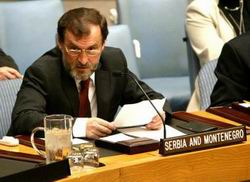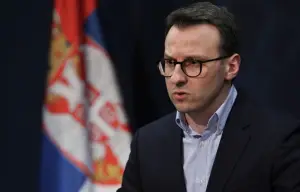Serbia-Montenegrin Foreign Minister Vuk Draskovic said at a session of the UN Security Council in New York today that the governments of Serbia and the State Union of Serbia and Montenegro are dedicated to ensuring equal rights for all citizens in Kosovo-Metohija, European standards in the province, and strict adherence to the UN Security Council’s Resolution 1244.
- Serbia
Get to know Serbia
- Citizens
Culture and science
Health services
Pension and disability insurance
- Business
Employment
Economy
- Media
- Government
- Contact
Keep in touch
Contact form
Back
Keepin touch
Whether you have a question, comment, suggestion or any problem in the purview of the government, send us your message and we will try to respond as soon as possible. If your problem is not in our purview, we will forward your message to the relevant institution.
Q:
A:
Serbian, Serbia-Montenegrin governments call for strict adherence to Resolution 1244
Belgrade/New York,
11 May 2004
He stressed that Belgrade, in its Plan for the Political Solution to the Situation in Kosovo-Metohija calls for establishing the highest level of autonomy for Serb municipalities, towns, villages, and enclaves.
According to him, the Serbian government defines these units of local self-government as regions, and he added that this type of autonomy is a way to create a multiethnic and multicultural Kosovo-Metohija, a road towards reconciliation between ethnic-Albanians and Serbs on all levels as well as towards their joint European future.
Draskovic said that the governments of Serbia and the state union endorses an open dialogue between Serbs and ethnic-Albanians on all levels, both direct talks and those mediated by the international community.
He said that Belgrade is not thinking about the province’s final status, since the rights of Serbs in Kosovo-Metohija are endangered. Such a state of affairs, he added, cannot represent a framework for any final status.
Draskovic also recalled that some 2,500 Serbs were killed or abducted between June 1999 and March 2004, adding that neither international nor local authorities responded resolutely enough.
Over the same period, said Draskovic, more than 200,000 Serbs were driven out of the province, with 40,000 Serb homes torched or demolished, along with 115 churches and monasteries and hundreds of graveyards.
International administrators and provisional institutions failed to respond resolutely enough, and on March 17, tens of thousands of ethnic-Albanians, encouraged by local media and extremists, started killing Kosovo Serbs and destroying and looting monuments of centuries-old Serb and Christian culture in the province.
Draskovic said he came to New York to call on the UN Security Council to ensure full adherence to the UN Charter as well as Resolution 1244.
He said that following the March violence against Kosovo Serbs and the devastation of their centuries-old churches and monuments of culture on March 17 and 18, the UN Security Council issued a statement which failed to convey an adequate response to the tragedy of the Serbian population in the province.
As for the “standards before status” policy, Draskovic said that the standards must be based on the elimination of all the consequences of the ethnic cleansing against Kosovo Serbs as well as on their full security, their right to life, along with other human rights. This means, said Draskovic, that the 40,000 burned and demolished homes are rebuilt urgently and that the reconstruction of churches, monasteries, and monuments of culture is launched immediately, under the supervision of UNESCO.
He also said that those responsible for murders, abductions, and vandalism against the cultural heritage in Kosovo-Metohija must be brought to justice and he added that international security forces are obliged to guard churches and monasteries, which represent the cultural heritage of the whole world.
Draskovic thanked UN Secretary General Kofi Annan on a thorough briefing on Kosovo-Metohija, adding that the Serbia-Montenegrin welcomes its objectivity and constructive conclusions.
According to him, the Serbian government defines these units of local self-government as regions, and he added that this type of autonomy is a way to create a multiethnic and multicultural Kosovo-Metohija, a road towards reconciliation between ethnic-Albanians and Serbs on all levels as well as towards their joint European future.
Draskovic said that the governments of Serbia and the state union endorses an open dialogue between Serbs and ethnic-Albanians on all levels, both direct talks and those mediated by the international community.
He said that Belgrade is not thinking about the province’s final status, since the rights of Serbs in Kosovo-Metohija are endangered. Such a state of affairs, he added, cannot represent a framework for any final status.
Draskovic also recalled that some 2,500 Serbs were killed or abducted between June 1999 and March 2004, adding that neither international nor local authorities responded resolutely enough.
Over the same period, said Draskovic, more than 200,000 Serbs were driven out of the province, with 40,000 Serb homes torched or demolished, along with 115 churches and monasteries and hundreds of graveyards.
International administrators and provisional institutions failed to respond resolutely enough, and on March 17, tens of thousands of ethnic-Albanians, encouraged by local media and extremists, started killing Kosovo Serbs and destroying and looting monuments of centuries-old Serb and Christian culture in the province.
Draskovic said he came to New York to call on the UN Security Council to ensure full adherence to the UN Charter as well as Resolution 1244.
He said that following the March violence against Kosovo Serbs and the devastation of their centuries-old churches and monuments of culture on March 17 and 18, the UN Security Council issued a statement which failed to convey an adequate response to the tragedy of the Serbian population in the province.
As for the “standards before status” policy, Draskovic said that the standards must be based on the elimination of all the consequences of the ethnic cleansing against Kosovo Serbs as well as on their full security, their right to life, along with other human rights. This means, said Draskovic, that the 40,000 burned and demolished homes are rebuilt urgently and that the reconstruction of churches, monasteries, and monuments of culture is launched immediately, under the supervision of UNESCO.
He also said that those responsible for murders, abductions, and vandalism against the cultural heritage in Kosovo-Metohija must be brought to justice and he added that international security forces are obliged to guard churches and monasteries, which represent the cultural heritage of the whole world.
Draskovic thanked UN Secretary General Kofi Annan on a thorough briefing on Kosovo-Metohija, adding that the Serbia-Montenegrin welcomes its objectivity and constructive conclusions.
-
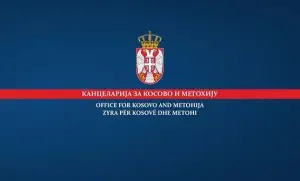 Belgrade, 1 March 2026
Belgrade, 1 March 2026Five Serbs from village of Suvo Grlo near Srbica in Kosovo and Metohija detained
-
 Belgrade, 25 February 2026
Belgrade, 25 February 2026Priština endangers survival of Serbs in Kosovo and Metohija with escalatory moves
-
 Belgrade, 12 February 2026
Belgrade, 12 February 2026Gratitude to Spain for consistent support on Kosovo and Metohija issue
-
 Belgrade, 10 February 2026
Belgrade, 10 February 2026Belgrade seeks urgent EU response over pressures on Serbian institutions in Kosovo and Metohija
-
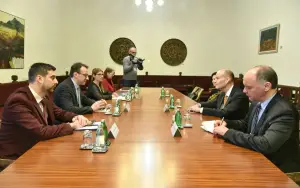 Belgrade, 5 February 2026
Belgrade, 5 February 2026UNMIK’s greater visibility, presence needed on ground
-
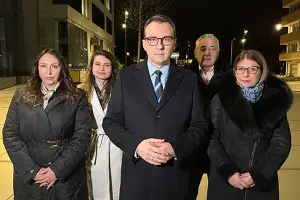 Belgrade/Brussels, 22 January 2026
Belgrade/Brussels, 22 January 2026Accelerate resolution of issue of missing persons
-
 Belgrade, 16 January 2026
Belgrade, 16 January 2026Concrete steps needed to establish Community of Serb Municipalities
-
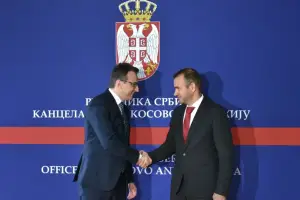 Belgrade, 11 December 2025
Belgrade, 11 December 2025Belgrade firmly committed to peace, stability in region
-
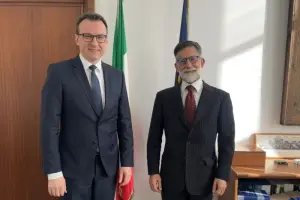 Belgrade/Rome, 10 December 2025
Belgrade/Rome, 10 December 2025Belgrade doing everything to preserve peace, stability in Kosovo and Metohija

